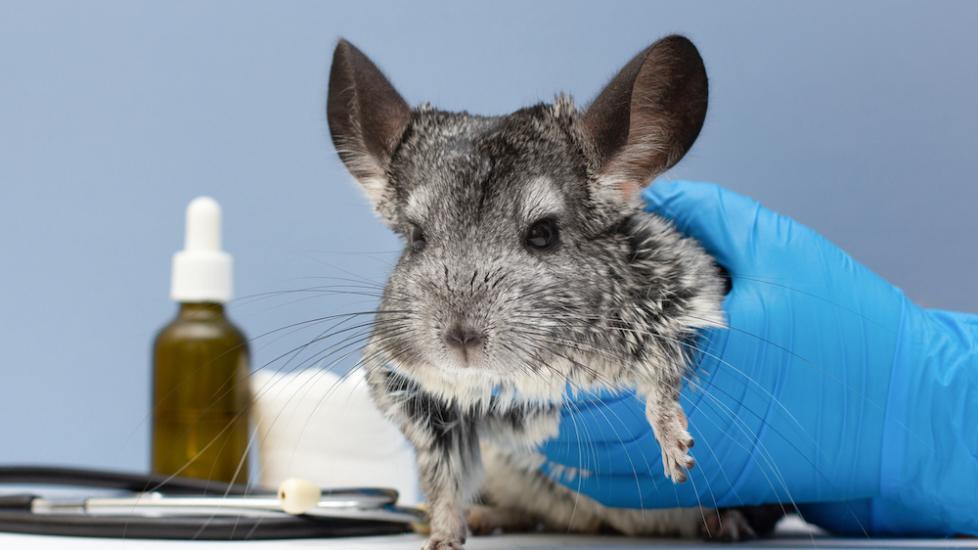Pneumonia in Chinchillas
What Is Pneumonia in Chinchillas?
Pneumonia occurs when there is irritation and inflammation of the lung tissue. This often causes fluid or pus to build up in the air sacs, which causes breathing difficulty. Pneumonia is uncommon in chinchillas, but can occur.
Pneumonia is a medical emergency and requires immediate medical treatment by your veterinarian.
Types of Pneumonia in Chinchillas
Aspiration pneumonia occurs when food or liquid gets accidentally inhaled into the lungs. This is uncommon in chinchillas but it can occur due to underlying dental disease. Chinchillas can also choke on foreign material if food gets lodged in the trachea.
The entrance of the trachea can be obstructed with food or foreign material in chinchillas. This can lead to lots of inflammation, irritation, and swelling. Chinchillas will cough as an attempt to remove the material, but chinchillas can deteriorate rapidly, suffocate, and die if not treated immediately.
Bacterial pneumonia develops when a bacterial organism infects the air sacs of the lungs. Chinchillas can develop bacterial pneumonia from bacteria including: Pasteurella, Bordetella, Streptococcus, and other bacterial organisms.
Fungal pneumonia occurs when a fungal organism infects the lung air sacs. This is not common in chinchillas.
Symptoms of Pneumonia in Chinchillas
-
Anorexia and weight loss
-
Poor hair coat
-
Lethargy
-
Difficulty breathing, increased/fast breathing, wheezing, open-mouth breathing
-
Nasal or eye discharge
-
Swollen lymph nodes
-
Abdominal breathing
Is Pneumonia Contagious To Other Chinchillas?
Bacterial pneumonia can be contagious to other chinchillas, so it is important to isolate symptomatic chinchillas away from other chinchillas while they are contagious. Correct any environmental issues such as poor ventilation or overcrowding so other chinchillas do not get stressed and also develop pneumonia.
Causes of Pneumonia in Chinchillas
Pneumonia typically occurs in chinchillas with a weaker immune system, either very young or very old. The immune system can also be compromised due to other diseases, stress due to overcrowding, aggression from other cage mates, and poor environmental conditions. Environmental conditions that can predispose chinchillas to pneumonia include poor ventilation, high heat, overcrowding, and high humidity greater than 70%.
Aspiration pneumonia or choking is caused by inhalation of food, foreign material, or liquids.
Bacterial pneumonia is caused by bacteria that are inhaled into the lungs and form an infection if the immune system is weakened. Bordetella, Streptococcus, and Pasteurella are most common.
Fungal pneumonia is caused by fungal spores inhaled into the lungs forming an infection. Although this is not common in chinchillas, it has been reported and associated with poor hay quality, moist environments, and a compromised immune system. The fungus Histoplasma capsulatum has been associated with hay and pneumonia in chinchillas.
How Veterinarians Diagnose Pneumonia in Chinchillas
A veterinarian will diagnose pneumonia through a thorough medical history, physical examination, and diagnostic tests. Your veterinarian may recommend the following:
-
Chest X-rays to evaluate the lung tissue and look for any signs pointing to bacterial or fungal pneumonia.
-
Culture and sensitivity tests or a tracheal wash to identify if bacteria is the root cause.
-
Bloodwork to evaluate any changes to organ function, look for any evidence of anemia, elevated white blood cells due to infection, and any other abnormalities.
-
CT scan of head if there is concern for dental disease predisposing your chinchilla to pneumonia
Treatment of Pneumonia in Chinchillas
Treatment for pneumonia depends on its type and the severity of symptoms. Aspiration pneumonia and bacterial pneumonia is treated with broad spectrum antibiotics. Fungal pneumonia is treated with antifungal medication.
Additional treatments may include:
-
Supportive care such as intravenous or subcutaneous fluid therapy
-
Nebulization to keep the airways moist or to deliver medication
-
Bronchodilators
-
Nonsteroidal anti-inflammatories
-
Topical eye drops
-
Nutritional support through hand feeding formulas
Chinchillas may require hospitalization in an oxygen chamber depending on the severity of debilitation.
Recovery and Management of Pneumonia in Chinchillas
If respiratory disease is moderate and the disease is caught early, typical treatment can last anywhere from two to eight weeks—longer if signs and symptoms persist.
Prognosis is poor when there is respiratory distress due to pneumonia. Chinchillas can also become septic or have blood poisoning which complicates treatment and can unfortunately become fatal.
It is important to monitor your chinchilla daily. If they start to show signs of respiratory distress again, have soft stools, or decreased appetite, contact your veterinarian immediately.
References
Quesenberry, Katherine, and James W. Carpenter. Elsevier Health Sciences. Ferrets, Rabbits and Rodents-E-Book: Clinical Medicine and Surgery. 2011.
Jörg Mayer, Donnelly TM. Clinical Veterinary Advisor. Elsevier/Saunders. Birds and Exotic Pets. 2013.
Johnson, Dan. The pneumonias of small mammals. 2009.
Merck Veterinary Manual. Chinchillas - Exotic and Laboratory Animals.
Garner, Michael M. "Diseases of pet hedgehogs, chinchillas, and sugar gliders." Proceedings of the Association of Avian Veterinarians. 2011.
Meredith, Anna, and Cathy Johnson Delaney. "BSAVA Manual of Exotic Pets 5th edition." 2010.
Featured Image: iStock.com/Irina Vasilevskaia
